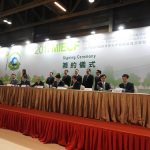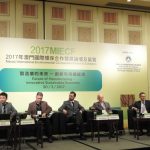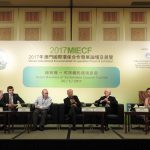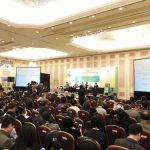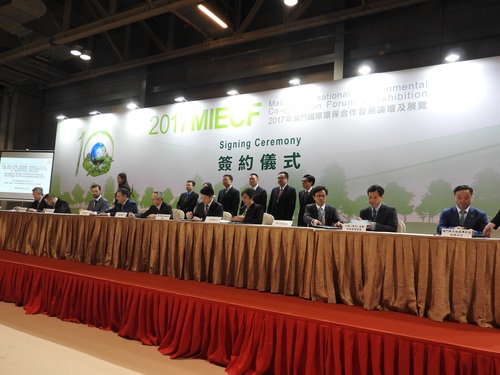 Thursday afternoon’s Signing Ceremony
Thursday afternoon’s Signing Ceremony
The “Green Business Co-operation Day”, organised by the Macao Trade and Investment Promotion Institute (IPIM), is one of the most important events at each annual edition of the Macao International Environmental Co-operation Forum and Exhibition (MIECF). This year's “Green Business Co-operation Day” was held today (30 March). The organiser invited business leaders, experts and scholars at home and abroad to explore topics related to innovation in the manufacturing industry and the tourism sector. Participants in the activity said they believe Macao can use its own advantages – in combination with the tourism resources of the neighbouring regions – to expand the opportunities for development of the local tourism industry.
The “Green Business Co-operation Day” is one of 2017MIECF’s serial activities, and includes the Green Business Forum sessions and a Signing Ceremony. This year’s “Green Business Co-operation Day” consists in two forum sessions, attracting nearly 380 participants. The first session was dedicated to the topic "Future of Manufacturing – Innovative Sustainable Economy", focusing on the transition from traditional manufacturing industry. Given the introduction of innovative business models, a new era of carbon emission awareness and consumers’ demand for enterprises that promote sustainable development, it is necessary for the manufacturing sector to find a new path for green development. Mr António Trindade, founding President of the Macao Association of Environmental Protection Industry, moderated the session. The speakers included: Mr Junji Hatano, Chairman and Chief Executive Officer of Carbon Partners Asiatica; Mr Vasco Pimenta, Chief Executive Officer of Spin.Works; Mr Roy Eric Xavier, Chairman of the International Macanese Alliance (AIM - Macau); and Mr Billy Hu, lecturer of the Dyson School of Design and Engineering, Imperial College London.
During the first session, the speakers discussed new environmentally-friendly technology which can help transform the manufacturing sector. Some of the speakers promoted the concept of a green contract, a system under which signatory enterprises need to follow guidelines for a green production process. Such a contract also requires application of green processes in administration, such as reduction of paper use. The participants also pointed out that Macao is closely linked to Mainland China, Portuguese-speaking Countries and the European Union because of its historical relations and its geographical location. In recent years, Macao has focused on diversifying its economy. Thus, it is strongly recommended that Macao strengthen its ties with the outside world, bringing new perspectives and views to Macao, in order to broaden the vision of its young people and promote the moderate diversification of local economy.
The second session focused on "Green Business of Sustainable Coastal Tourism", exploring the concept of Macao as a world centre of tourism and leisure. It was suggested that the joint efforts by local "production, learning and research sectors" on innovative models were likely to prove the best practice for promoting the sustainable development of Macao's tourism sector. Ms Fanny Vong, President of Macao’s Institute for Tourism Studies, was the moderator of the second session. The speakers included: Mr Andrew Jones, Chairman of the Asia-Pacific Travel Association; Mr Ieong Tou Hong, Chairman of the Macau Economic Development Promotion Association; Mr Yu Youkang, Deputy Director of the CCP Zhuhai Municipal Committee Policy Research Office and the Zhuhai City Economic and Social Development Research Centre; Mr Sébastien Portes, General Manager of Club Med, Hong Kong and Macao Region.
Some of the speakers believe that Macao can use its own advantages in combination with the tourism resources of neighbouring regions, jointly to support the development of the tourism sector. For instance, the idea of joint development of "one channel and two sides" supporting tourism, making the best use of Cotai and Hengqin areas separated by a strip of water. The fact that Macao is able to administer 85 square kilometres of its surrounding waters is good for both the tourism industry and the general public. That fact should also be balanced with the need for conservation of maritime resources, said the speakers. Macao and other places in the Pan-Pearl River Delta Region should develop an improved model for co-operation. Some of the participants in the session believe that the said development of supporting tourism is a good idea, but Zhuhai and Macao should also try to maintain their own unique resources in order to remain attractive to tourists. A factor in this regard is to educate the public about the need for environmental protection. Only through joint efforts between government, enterprises and the public can the environment and the ecological system be kept in balance. Participants also made a number of suggestions related to tourist co-operation between Macao and Guangdong Province.
A Signing Ceremony took place at 5:30pm today, the first day of 2017MIECF, at Exhibition Hall A of the Venetian Macao-Resort-Hotel. A total of 29 agreements were signed, covering co-operation between business associations, environmental technical co-operation, environmental project co-operation, projects related to photovoltaic solar energy systems, waste recycling, air quality projects, creation of a big-data platform related to environmental protection and energy saving, and agency services for environmental protection products. The organisations signing the agreements hailed from several countries and regions, including Mainland China, Cambodia, Italy, Portugal, Vanuatu, Taiwan, Hong Kong and Macao.
View gallery

